
|
|
Since its inception, the Tata Steel Group has laid extreme emphasis on transparency, ethics and care for the community. The National Voluntary Guidelines (NVG) re-inforce the Company's belief in the stated principles and help maintain its focus. |

PRINCIPLE 1 Ethics, Transparency and Accountability 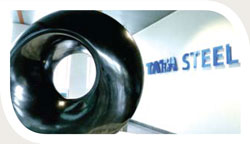
The Tata Code of Conduct (TCoC) encapsulates the ethical practices followed by all Tata Group companies for over a century. These guidelines – repeatedly and continuously reaffirmed – has led to Tata Steel being ranked, once again, among the "World's Most Ethical Companies" in 2013 by the Ethisphere Institute. All employees, suppliers, vendors, contractors and their work forces, partners and joint ventures are expected to adopt TCoC or a joint code of conduct incorporating all elements of the TCoC. The Management of Business Ethics stands on the four-pillar concept of Leadership, Communication and Awareness; Compliance structure; and Evaluation of Effectiveness. To improve the implementation of the TCoC, the Company has adopted various policies like the Gift Policy, Whistle Blower Policy, Sexual Harassment Prevention and Redressal Guidelines, etc. Tata Steel has a zero tolerance policy towards corruption or violations of the TCoC. All officers have to submit a Conflict of Interest declaration (COI). 
PRINCIPLE 2 Maximising the sustainability of goods and services throughout their lifecycle 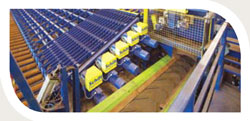
The Company places great emphasis on making products and processes more efficient and sustainable. The Company's Technology Roadmap identifies projects aimed at increasing the yield of high quality raw materials while effecting reductions in energy use and emissions. Making extensive use of life cycle assessment, the Company advises customers at the design stage of their products made from steel to help minimise energy usage. Tata Steel in Europe has invested significantly in the development of life cycle assessment models for many sectors. Developments in the automobile sector are driven by fuel efficiency, eco-friendliness, safety and cost. High strength steel makes automobiles safer and reduces the weight of vehicles thus reducing steel consumption, achieving greater fuel efficiency due to the lighter weight of the car and reducing carbon emissions throughout the value chain. NatSteel's Singapore plant processes and recycles ferrous scrap materials, in one of the world's most energy efficient Electric Arc Furnace, into high quality steel products used in the building and construction industry. 
PRINCIPLE 3 Enriching the quality of life of employees and maximising their potential 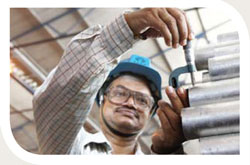
The Company believes that healthy employee unions, consultative and collective bargaining forums, platforms for employee participation and grievance redressal mechanisms secure employee well-being and industrial harmony. The core principles enshrined in its Human Resources Policy, and now applied across the Tata Steel Group worldwide, are: equality of opportunity, continuing personal development, fairness, mutual trust and teamwork. The Company conducts employee engagement surveys through expert agencies to identify areas to improve upon towards building a motivated and productive workforce. Both Tata Steel and NatSteel received the World Steel Safety & Health Excellence Recognition Award 2012 for positively embracing the safety and health principles of the World Steel Association. Tata Steel encourages its employees to prioritise between work and a satisfying, enriching life. Based on the results of an Employee Happiness Survey, the Company focused on improvements in employee housing, services at its hospitals, canteens as well as other amenities. Several initiatives for women have promoted their work-life balance. 
PRINCIPLE 4 Inclusive growth through stakeholder engagement 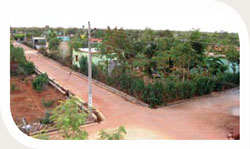
The Company's value creation process encompasses the interest of all its stakeholders. It believes in fostering relationships built on trust, mutual respect, open and credible communication with various stakeholders like customers, suppliers, vendors, employees, communities, investors, governmental bodies, media, etc. Various stakeholder facing departments exist to take the engagement forward by identifying issues and opportunities. The senior and top management also participate in these interactions as per well laid out engagement plans. The interests of rural communities where the Company operates, which are among the least developed regions of the country, are served through multiple agencies with well-defined objectives. Their purpose is to enhance the quality of life of people through interventions in health, education, agriculture, skills development, self-help groups and ethnicity. To foster greater social cohesion among communities for a sustainable society, the Company brings together community committee members and local opinion leaders with the management through structured mechanisms that encourage joint efforts to resolve local problems. The Company has created a Grievance Redressal Group to conduct third-party social audits of its Rehabilitation and Resettlement measures by an eminent group of people. 
PRINCIPLE 5 Businesses should respect and promote human rights 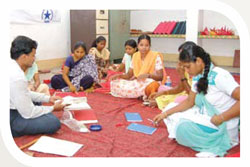
Tata Steel believes that embedding respect for the human rights of stakeholders across its operations is central to creating a positive impact on the community it serves. Therefore, all constituent units of the Company accord the highest value to human rights, endorsing their universal, inalienable and incontrovertible nature. The Company also aims to guarantee equal opportunities to all its employees and all qualified applicants for employment without regard to their race, caste, religion, colour, ancestry, marital status, sex, age, nationality and different ability status. Deployment of the Tata Code of Conduct through a formal structure for the Management of Business Ethics and auditable frameworks such as SA 8000 allow for widespread understanding of the applicability of human rights in business operations, including its supply chain. The Company's Corporate Social Responsibility & Accountability Policy, Human Resource Policy, Affirmative Action Policy, Sustainability Policy, Sexual Harassment Policy, Responsible Procurement Policy and vendor management process are aimed at perpetuating and promoting norms that reflect the commitment of the Company to ensure Human Rights for all stakeholders. 
PRINCIPLE 6 Protecting the Environment 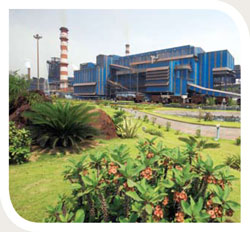
Over the years, the Company has invested in initiatives that proactively nurture the environment. Various divisions of the Company across the world have each contributed to this effort. By-products of the steel making processes are not always easily recyclable – and thus the Company invests substantially in R&D efforts to enhance yield and maximise utilisation of raw material. Reduce, reuse and recycle is the mantra that the Tata Steel Group follows. A key focus is the reduction of CO2. Across all facilities of the Company, targeted emission parameters are monitored. All manufacturing sites have implemented Environment Management Systems. Regular audits and reviews ensure that continual improvement is achieved and wherever required, corrective actions are taken. Programmes such as Clean Green and Safe in Singapore, Green Team in Canada, YmGreen in the Netherlands and Greenfection in India have resulted in proactive action and significant energy saving. 
PRINCIPLE 7 Policy advocacy 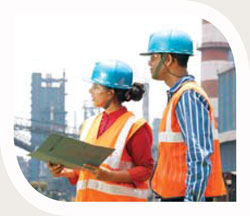
As India's leading corporate entity and a member of the World Steel Association, the Company's endeavour is to bring an understanding of sector-specific, local and global sustainability concerns to local and national policy making processes. The Company is a member of the Steel Manufacturing, Mining and Environment committees of the Confederation of Indian Industries and the Federation of Indian Chambers of Commerce and Industry, as well as an executive committee member of the Federation of Indian Mineral Industries. The Company is listed among the "World's Most Ethical Companies". With a strong belief in sustainable progress, the Company has made suggestions to the Government of India to put into place certain procedures to aid in the area of Environmental Clearances, Mining issues and Policy Legislation NatSteel, Singapore regularly engages with key government stakeholders to foster better relations and positively influence the construction industry. 
PRINCIPLE 8 Inclusive growth and equitable development 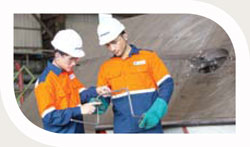
The operational areas of the Company in the states of Jharkhand and Odisha are plagued by poor social infrastructure for health services, education, roads, electricity and other basic amenities. The Tata Steel Rural Development Society and Tribal Cultural Society undertake development interventions in consultation with the community to complement the efforts of local government agencies. The thrust areas for the Company are education, sustainable livelihood – especially skill development and employability training – and health care, all of which are an element of the Human Development Index, a quality of life indicator. The Company's initiatives touched nearly 2 million lives last year. The Company's range of interventions encompassed infrastructure support to rural and urban schools through scholarships and coaching classes as well as incentives like free mid-day meals to encourage attendance form part of its key thrust area for improving the quality of life. NatSteel, Singapore operations span several countries. It is actively involved in community work and corporate philanthropy through its "Building Beyond Borders" programme. 
PRINCIPLE 9 Value to customers 
Value creation is the process of going beyond meeting the customer's basic needs. The Company at its various geographies, has developed a wide range of products that add value at multiple levels. The Indian and European operations have been working on developing further higher strength steels for more fuel efficient automobiles and efficient steel usage in construction. The Company also develops products which reduce the environmental impact during processing at its downstream industries. Tata Shaktee, a flat product brand from the Company, introduced 'Roof Junction' – a solution to ameliorate problems caused by improper fixing resulting in rainwater leakage and subsequent rusting. Responsible Architectural Initiatives and Structural Engineering (RAISE) drives responsible construction practices. BuildWISE offers individual home builders 'Supervisory Services' and the support of Customer Service. |

- Management
- |
- Financial Highlights
- |
- Integrated Reporting
- |
- NVG Principles
- |
- Directors' Report
- |
- MDA
- |
- Financials
- Balance Sheet
- Profit & Loss Account
- Cash Flow Statement
- Notes
- Auditors' Report on Consolidated Financial Statements
- Consolidated Balance Sheet
- Consolidated Statement of
Profit and Loss - Consolidated Cash Flow Statement
- Notes to Consolidated Balance Sheet and Statement of Profit and Loss
- Attendance Slip and Proxy Form
- The Deming Grand Prize
- |
- Notice
- |
- Downloads
Home  NVG Principles NVG Principles
|
